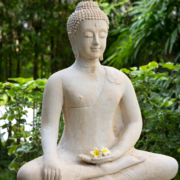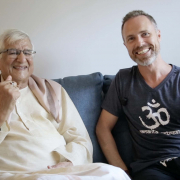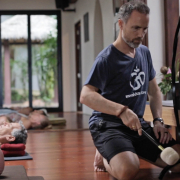 https://samahitaretreat.com/wp-content/uploads/2023/11/IMG_5161-scaled.jpg
2560
1707
Kirsten Mia
http://samahitaretreat.com/wp-content/uploads/2024/01/samahita-logo-v2.svg
Kirsten Mia2023-11-01 03:57:462023-11-02 06:11:16The Buddha, the Dharma, the Sangha
https://samahitaretreat.com/wp-content/uploads/2023/11/IMG_5161-scaled.jpg
2560
1707
Kirsten Mia
http://samahitaretreat.com/wp-content/uploads/2024/01/samahita-logo-v2.svg
Kirsten Mia2023-11-01 03:57:462023-11-02 06:11:16The Buddha, the Dharma, the SanghaAparigraha – The Art of What is Needed

“It is not the receiver who is blessed but rather the giver.” Swami Vivekananda
I have always loved this quote as it highlights a very great truth which if understood can really refine how we develop as individuals and grow within a practice of yoga.
The essence of it is a lack of, or at least a reduction in, selfish behavior. The mental attitude is not one of “what am I going to get, what can I get or I really want that”, but rather no interest to acquire and keep. There is a stronger urge to give and share, use things as needed and be willing to let them go when done.
Also in this statement of Swamiji’s is a reversal of a strong inborn pattern which compels us to hold on to things, to ask for things and to want more things. Just by giving freely, especially of things that are actually of value to us, we unravel a pattern formed over millennia that has held us back from our own development. When you do so, not once but now as a new “habit”, you can literally feel the shift right through your nervous system.
This gets at the heart of “aparigraha”. To break down its literal meaning we find three components; first is “graha” which means to grab or take, second is “pari” which means from all sides and lastly is “a” which negates it adding a “non”. So we come up with a meaning of not taking more than is needed, non-acceptance, non-accumulation; all part of the development of an attitude of detachment or non-dependence.
By its nature it is a great remedy for the affliction of greed, but so are the other Yamas. It is more than just managing greed, it is a real respect for others and nature. Modern man has done its best to not just maximize nature’s resources but exploit them to the point of over-indulgence and a real lack of respect for nature’s forces. Additionally, aparigraha is a respect for oneself, treating the body and material possessions for what they are and not getting held back by them. The lack of material bondage allows the spirit to reveal itself.
Aparigraha is the art of what is needed. Truly applied it is a great freedom for the practitioner and distills all our material and psychological possessions down to what we need.
We need clarity of mind to see the need as it often gets mixed up with our desires. There is nothing wrong with satisfying a desire provided it does not supersede a need. It gets confusing for people to decipher in the realm of our basic bodily needs where we mix up needs and desires of food, drink, sex, shelter and clothing. Often we will force a situation, abuse someone, be dishonest, take beyond our means, follow the senses, all just to satisfy a desire. To help us distinguish what is needed more clearly we need the help of the previous four Yamas. These are promises we have already made for ourselves; to be respectful and not hurt, to be honest, to use or take what has been earned, to be non-indulgent with the senses but rather respect the power behind them. The combination together along with the essence of aparigraha, taking only what is needed, brings about a refinement of this virtue.
Aparigraha on one side is a balance in taking and receiving while on the other is in keeping and giving away. To receive and not share is selfish and deprives others of income and experiencing similar benefits from needed objects. It is true not only for material items but also for subtle elements like certain teachings and great truths.
To apply aparigraha can be a great source of healing. It is the art of decluttering, something in vogue today in self-help circles. Give away all things you do not use or need anymore. Now see how light you feel. Even more effective in healing, but perhaps harder to achieve, is letting go of many of the ideas, prejudices and past hurts we continually hold on to. Forgiveness is a powerful tool here. Clear the space between you and the other. You may not need to reignite the relationship but you can feel clearer and lighter by directly letting go of that “story”.
There is a beautiful use of words in Sanskrit that says “idam na mam”, meaning “this is not mine”. Whenever we practice and perform a ritual which involves offerings, “swaha”, we follow it with “idam na mam”. It is a sense of giving back and an understanding that this is not mine anyway, I have received all from You (Divine, Nature) and I gladly and respectfully return. The doing of this in a conscious manner helps refine the spirit of non-acceptance and non-hoarding.
As with all these values and practices there is always a fine line. We all meet someone with their own strong opinion stating that such and such should be given because they want it that way. Even more so we have to be clear on what is needed and what is to be given when and why. Though the person demanding in this case may not see it so, over-giving will throw off the balance, leave the receiver in some kind of debt while satisfying their desires and demands. The giving does not stop but it is spread and shared. An unselfish attitude predominates and we are never afraid to give when called upon but discriminative in the how, when and where.
From a yoga practice point of view aparigraha is a tremendous help. The Bhagavad Gita (VI.10) highlights this, that a Yogi should abandon all possessions which work as a hindrance in the path of yoga. This attitude of being free to give and non-dependent or not holding on to things frees the practitioner from bodily and sensual demands. All worldly possessions and the memories we hold on to, have to do with our present life. We neither bring them with us nor carry them to our next life. Hence, when we completely detach ourselves from them we get inquisitive about our past and future existence. This is the focus in the Yoga Sutra. Patanjali does not define aparigraha but just gives an explanation of its outcome in II.39:
“On attaining perfection in non-acceptance, knowledge of past and future existence arises.”
In time one becomes conscious of the body as a superfluous burden and separate from the self. Rising above bodily delusion one comes to know about one’s past and future lives.
The less importance we put on having this or that the freer we become, in a sense free from the psychological burdens others may place on us, not dependent on current wants and the consciousness is now free to experience our true nature at a deeper level. Possession previously had required a resource of prana which now is free to harness the potential within.
When someone offers you something be respectful and accept. You can choose to share it with others or pass on to one more in need of it than yourself. The more neutral you are in this the clearer you remain. The majority of what is given comes attached with the hopes, desires and agenda of the giver. In other words you receive the psychological burden along with the material element. This is of paramount importance for a yoga practitioner. Taking it a step further it definitely requires we don’t go begging or asking for things which always implies a restlessness within. It will come as is needed. Can you trust that?
There is a nice phrase, whatever you own really owns you. There is trouble in acquiring possessions for pleasure and enjoyment. We use up valuable nervous mental energy to get it, worry about keeping it and grieve when losing it. Further, the impression of them leaves a longing which causes further unhappiness in the future. To know this can help immensely in freeing oneself from the burden of unnecessary possession. Just take what is needed. Likewise, do not preserve wealth without utlising it for the good of others.
Most of us like to shop. What would modern society be like without it. Just make a personal decision for ourself how much time and energy is needed for it and base it on the principle of need. Still get nice things, designer if we like. We don’t need to live like monks, shave our heads and give away everything. We just need to be balanced and judicious in what we have, use and keep.
To progress in yoga maintenance of the body and an appropriate environment for practice is essential. So earning a living that supplies food, clothing and shelter is needed. This will also vary at different stages in life. A new graduate going out looking for opportunities, perhaps with a yoga practice started, needs little beyond clothes and a cheery attitude. Another with a family and bills has a different level of responsibility to fulfill. Then when work and family duties are completed again a much simpler level of personal possession is required, though one may have a risen to a wealthy and powerful position by this stage their attitude is one more of a steward of the wealth. The outer display of aparigraha is of no value without the inner attitude of free from ownership and possession.
Having or not having should not cause you to be angry and hurtful, dishonest and greedy, self-indulgent and selfish. Please, see what you need and apply that in your life, always with an inwardly detached attitude.
Dr. Paul Dallaghan’s expertise with breathwork, body and meditative practices comes from three sources: (1) three decades of daily dedicated practice and teaching these techniques; (2) uniquely acknowledged in the Yoga tradition by the title of “Master Yogi-Prānācharya (expert in breath)”, following an immersion in the original culture through one-on-one direct training in practice and study of ancient texts; (3) a PhD in doctoral scientific research at a leading US university (Emory) covering both the tradition and science of yoga and breath practices in terms of stress, health and aging. As a result, Paul occupies a unique space to impart genuine teaching and science on the breath, body, and meditative practices, seen as a Teacher-of-teachers and identified to carry on the tradition of Pranayama. His sincere and ongoing role is to teach, write and research, to help put out experienced and authentic information on these areas of how we live, breathe and be, to help people improve their mental and physical health, and live more fulfilling lives.
For more on his background see his bio
More from the Samahita Blog







